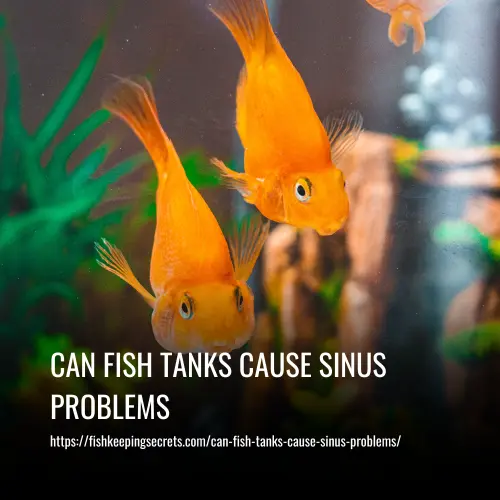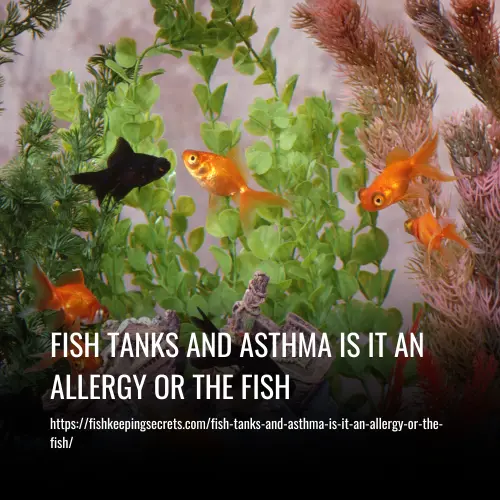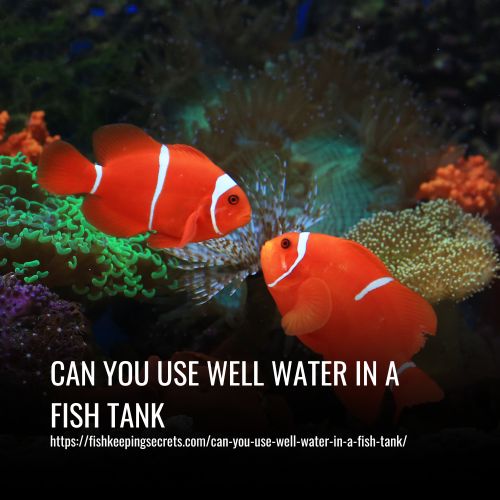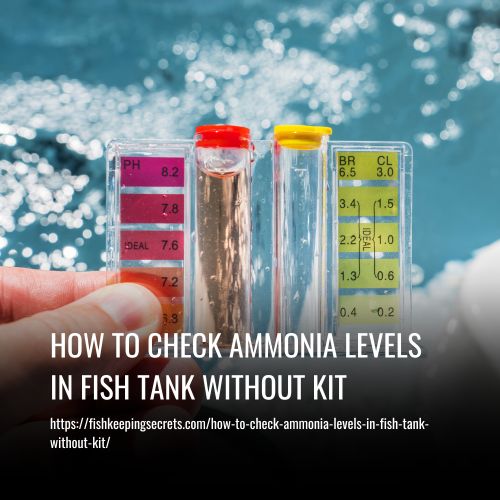Can Fish Tanks Cause Sinus Problems
This post contains affiliate links. As an Amazon Associate, we earn from qualifying purchases.
Fish tanks can potentially cause sinus problems in rare cases. One such condition is fish tank granuloma, which occurs in people who are exposed to fish or aquatic environments. This condition is caused by Mycobacterium marinum and can result in the formation of granulomas on the skin of the upper limb, face, or even the nasal cavity.
While this is a rare occurrence, it is important to be aware of the potential risks associated with fish tanks and take proper precautions to maintain a clean and healthy environment.

Types of Fish Tanks
The most common type of tank is the freshwater aquarium, which requires a filtration system, regular water changes, and frequent monitoring of water quality. The challenge here is to create an environment that meets the needs of your particular fish species. You may need to add decorations or live plants depending on the type of fish you choose.
Saltwater tanks require even more maintenance since they require additional equipment like protein skimmers and powerheads. It can be intimidating for a beginner but it’s worth the effort since saltwater tanks often produce stunning results with their vibrant colors and unique inhabitants.
If you don’t have much space or time for maintenance, then you might consider a nano tank. These small tanks are great for beginners as they are easy to set up and maintain but still provide plenty of room for interesting decor and inhabitants.
No matter what type of tank you choose, it’s important to do your research ahead of time so that you know what kind of equipment is necessary and how much work will be involved in keeping it running smoothly. With some hard work and dedication though, any type of tank can become an enjoyable hobby!
Risk Factors for Sinus Problems from Fish Tanks
While many people have enjoyed these tanks without any problems, it is important to understand that there are some risk factors that can lead to sinus problems as a result of fish tanks. One such factor is bacterial infections. Tropical fish in particular can carry certain bacteria that can easily spread between different tanks and even cause infection in humans if they come into contact with it.
Pet stores should be monitored closely for good hygiene standards, as this is where most infectious bacteria may originate from. Additionally, air fresheners should not be used in an aquarium, as this could further increase the risk of infection by introducing new bacteria into the environment.
Mycobacterium marinum infection is another concern when it comes to potential sinus issues from fish tanks. This condition can cause skin lesions in healthy people and even opportunistic infections such as cat-scratch disease or lymphocytic choriomeningitis virus infection in those with weakened immune systems or existing medical conditions.
Finally, litter boxes should also be kept away from the tank and breeding grounds for potentially dangerous organisms should be avoided at all costs. By following these simple safety measures, you can help ensure your health and that of your aquatic friends!
Symptoms of Sinus Problems from Fish Tanks
Although most people associate fish tanks with beauty and relaxation, they can also be a source of several unpleasant symptoms. Sinus problems caused by fish tanks can range from mild discomfort in the form of nasal congestion or irritation to more severe symptoms like coughing, sneezing, and headaches.
In some cases, these symptoms may be due to bacteria that have been allowed to build up in the tank over time. This is why it’s so important for pet owners to regularly clean and disinfect their tanks using bleach or other appropriate cleaning solutions. Additionally, air fresheners should not be used as they can create an environment that encourages bacterial growth.
It’s also worth noting that sickly-looking fish have been known to carry diseases such as cat scratch disease which can be transmitted to humans through contact with any part of the animal itself or its habitat. As such, it’s always wise to take note of any changes in your pet fish’s appearance or behavior and make sure you seek out professional advice if necessary.
Finally, people with a weakened immune system should take extra precautions when interacting with pet fish in order to avoid infection; this includes avoiding close contact with their hands or clothing and making sure their medical history is up-to-date. Taking these steps will help ensure that everyone remains healthy and safe around pet fish tanks!
Diagnosis of Sinus Problems from Fish Tanks
Diagnosis of Sinus Problems from Fish Tanks:
- Medical History Evaluation
- Physical Examination
Treatment of Sinus Problems from Fish Tanks
First and foremost, it’s important to maintain good hygiene in your tank environment. Make sure you clean the tank regularly and use an air freshener if necessary. You should also ensure any tropical fish or other aquatic species you have are healthy and free of bacterial infections. If you purchase new fish from a pet store, make sure they come from reputable sources where diseases won’t easily spread.
Mycobacterium marinum infection is a risk of infection associated with tanks containing tropical fish, but this is rare as long as proper hygiene is practiced. However, there are other opportunistic infections that can result from human exposure to animal-associated bacteria such as cat-scratch disease or lymphocytic choriomeningitis virus infection.
According to the Centers for Disease Control and Prevention (CDC), the majority of pet-associated infections do not typically cause serious illness in healthy people; however, some cases may require medical attention depending on the individual’s medical history and underlying conditions.
Ultimately, following best practices for cleaning your tank environment can help reduce the risk of sinus problems caused by your fish tank or any other kind of breeding ground for bacteria or viruses. Regularly monitoring your own health for any signs of respiratory issues like shortness of breath is also important—if anything changes it may be time to consult a doctor about it.
Prevention of Sinus Problems from Fish Tanks
Having tropical fish tanks in the home can be a fun hobby, but it can also come with some potential risks to human health. Fish tanks are breeding grounds for bacteria and other microorganisms, and some of these can cause serious infections if they come into contact with humans. The Centers for Disease Control and Prevention (CDC) recommends that anyone who owns a fish tank take certain precautions to reduce the risk of infection.
First, it is important to keep your tank clean at all times. Regular water changes and filter maintenance will help keep bacterial levels low. Also, use air fresheners or deodorizers in the tank to reduce odors which could attract more bacteria. Additionally, be sure to wear gloves when cleaning your tank or handling any of the equipment associated with it. Mycobacterium marinum is one type of bacteria found in aquariums that can cause skin infections if you come into contact with it without proper protection.
Finally, purchase fish from reputable pet stores and research any new species before bringing them home. Some types may carry cat-scratch disease or lymphocytic choriomeningitis—both of which can cause serious illnesses in healthy people as well as those with compromised immune systems. By following these safety tips, you can help prevent sinus problems associated with owning a fish tank while still enjoying the beauty of your aquatic friends!
FAQs
Yes, fish tanks can potentially cause sinus problems for some individuals. The moist environment of a fish tank can promote the growth of mold, bacteria, and algae, which can trigger sinus issues in people who are sensitive to these allergens.
Symptoms may include nasal congestion, runny or stuffy nose, facial pressure or pain, headaches, cough, and postnasal drip. These symptoms can vary in severity depending on the individual and their sensitivity to allergens.
Regularly cleaning and maintaining the fish tank, including changing the water, removing debris, and keeping the tank and filter clean, can help prevent the growth of allergens. Using a good quality air filter in the room with the fish tank can also help reduce the spread of allergens.
Yes, individuals with pre-existing allergies, asthma, or other respiratory conditions may be more susceptible to sinus problems caused by fish tanks. It’s important for these individuals to be mindful of the potential allergens and take preventive measures.
If you have sinus issues, you can still have a fish tank, but it’s important to take extra precautions to prevent the growth of allergens. Regular maintenance and keeping the tank and the surrounding area clean can help minimize the risk of sinus problems.
If you experience persistent or severe sinus symptoms that do not improve with preventive measures or over-the-counter treatments, it’s important to see a doctor for further evaluation and treatment.
Saltwater tanks may be less likely to cause sinus problems, as the water tends to have a lower risk of bacterial growth. However, proper maintenance is still important for preventing potential issues.
While sinus problems from fish tanks are usually not serious, they can be bothersome and affect the quality of life. In some cases, individuals with severe allergies or respiratory conditions may experience more serious symptoms and should seek medical advice.
Conclusion
In conclusion, there are many potential causes of sinus problems and it can be difficult to determine which ones are associated with fish tanks. However, if you think that your allergies or sinus discomfort is caused by a fish tank, it’s best to consult with a doctor to confirm the diagnosis and begin an appropriate treatment regimen.
Additionally, you may want to consider getting an air filter or increasing ventilation in your home to reduce the amount of dust particles and allergens in the air coming from your fish tank. Doing so can help alleviate existing sinus issues and prevent them from occurring again in the future.






